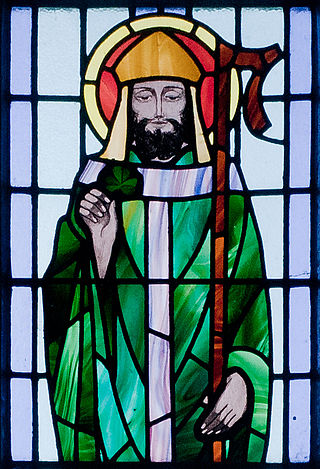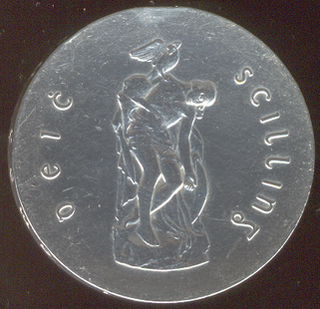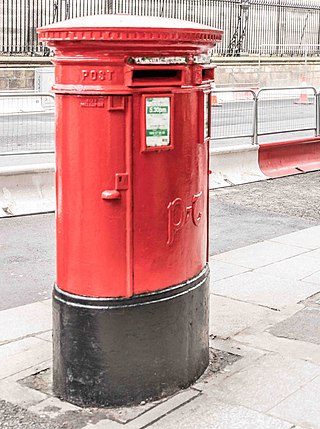Related Research Articles

The Easter Rising, also known as the Easter Rebellion, was an armed insurrection in Ireland during Easter Week in April 1916. The Rising was launched by Irish republicans against British rule in Ireland with the aim of establishing an independent Irish Republic while the United Kingdom was fighting the First World War. It was the most significant uprising in Ireland since the rebellion of 1798 and the first armed conflict of the Irish revolutionary period. Sixteen of the Rising's leaders were executed starting in May 1916. The nature of the executions, and subsequent political developments, ultimately contributed to an increase in popular support for Irish independence.

The standard circulating coinage of the United Kingdom, British Crown Dependencies and British Overseas Territories is denominated in pennies and pounds sterling, and ranges in value from one penny sterling to two pounds. Since decimalisation, on 15 February 1971, the pound has been divided into 100 (new) pence. Before decimalisation, twelve pence made a shilling, and twenty shillings made a pound.

Anzac Day is a national day of remembrance in Australia and New Zealand that broadly commemorates all Australians and New Zealanders "who served and died in all wars, conflicts, and peacekeeping operations" and "the contribution and suffering of all those who have served". Observed on 25 April each year, Anzac Day was originally devised to honour the members of the Australian and New Zealand Army Corps (ANZAC) who served in the Gallipoli campaign, their first engagement in the First World War (1914–1918).
The Kwacha is the currency of Zambia. It is subdivided into 100 Ngwee.

Remembrance Day is a memorial day observed in Commonwealth member states since the end of the First World War to honour armed forces members who have died in the line of duty. The day is also marked by war remembrances in several other non-Commonwealth countries. In most countries, Remembrance Day is observed on 11 November to recall the end of First World War hostilities. Hostilities ended "at the 11th hour of the 11th day of the 11th month" of 1918, in accordance with the armistice signed by representatives of Germany and the Entente between 5:12 and 5:20 that morning. The First World War formally ended with the signing of the Treaty of Versailles on 28 June 1919.

The General Post Office is the former headquarters of An Post — the Irish Post Office. It remains its registered office and the principal post office of Dublin — the capital city of Ireland — and is situated in the centre of O'Connell Street, the city's main thoroughfare. It is one of Ireland's most famous buildings, not least because it served as the headquarters of the leaders of the Easter Rising against British rule in Ireland. It was the last great Georgian public building to be erected in the capital.

Saint Patrick's Day, or the Feast of Saint Patrick, is a religious and cultural holiday held on 17 March, the traditional death date of Saint Patrick, the foremost patron saint of Ireland.

The British crown was a denomination of sterling coinage worth 1⁄4 of one pound, or 5 shillings, or 60 (old) pence. The crown was first issued during the reign of Edward VI, as part of the coinage of the Kingdom of England.

Easter Monday is the second day of Easter and a public holiday in some countries. In Western Christianity it marks the second day of the Octave of Easter; in Eastern Christianity it marks the second day of Bright Week.
In Ireland, the National Day of Commemoration commemorates all Irish people who died in past wars or United Nations peacekeeping missions. It occurs on the Sunday nearest 11 July, the anniversary of the date in 1921 that a truce was signed ending the Irish War of Independence. The principal ceremony is held at the Royal Hospital Kilmainham, Dublin, Ireland.

Decimal Day in the United Kingdom and in Ireland was Monday 15 February 1971, the day on which each country decimalised its respective £sd currency of pounds, shillings, and pence.
Events in the year 1966 in Ireland.
The pound is the currency of Guernsey. Since 1921, Guernsey has been in currency union with the United Kingdom and the Guernsey pound is not a separate currency but is a local issue of sterling banknotes and coins, in a similar way to the banknotes issued in Scotland, England and Northern Ireland. It can be exchanged at par with other sterling coinage and notes.

The quarter, short for quarter dollar, is a Canadian coin worth 25 cents or one-fourth of a Canadian dollar. It is a small, circular coin of silver colour. According to the Royal Canadian Mint, the official name for the coin is the 25-cent piece, but in practice it is usually called a "quarter", much like its American counterpart. In Canadian French, it is called a caribou or trente sous. The coin is produced at the Royal Canadian Mint's facility in Winnipeg, Manitoba.

The ten shilling (10s) coin was a one-off commemorative coin issued in Ireland in 1966 to mark the 50th anniversary of the Easter Rising. Ten shillings was a subdivision of the pre-decimal Irish pound, worth 1⁄2 of an Irish pound, making this the highest-value coin in the pre-decimal system.
There have been three sets of coins in Ireland since independence. In all three, the coin showed a Celtic harp on the obverse. The pre-decimal coins of the Irish pound had realistic animals on the reverse; the decimal coins retained some of these but featured ornamental birds on the lower denominations; and the euro coins used the common design of the euro currencies. The pre-decimal and original decimal coins were of the same dimensions as the same-denomination British coins, as the Irish pound was in currency union with the British pound sterling. British coins were widely accepted in Ireland, and conversely to a lesser extent. In 1979 Ireland joined the Exchange Rate Mechanism and the Irish pound left parity with sterling; coin designs introduced after this differed between the two countries.

Rebellion is a 2016 historical drama television serial written and created by Colin Teevan for RTÉ. The series is a dramatisation of the events surrounding the 1916 Easter Rising. The story is told through the perspective of a group of fictional characters who live through the political events. The series was produced to commemorate the 100th anniversary of the Easter Rising. The ensemble cast includes Charlie Murphy, Ruth Bradley, Sarah Greene, Brian Gleeson, Niamh Cusack, Michelle Fairley and Ian McElhinney.

The Easter Rising centenary parade took place in Dublin city on Easter Sunday, 27 March 2016 to commemorate the centenary of the Easter Rising. It involved all branches of the Defence Forces, including the Army, Air Corps, Naval Service and Reserve Defence Forces, as well as the Garda Síochána, Dublin Fire Brigade, the HSE National Ambulance Service, the Irish Coast Guard, the Irish Prison Service and Customs, the Red Cross, the RNLI, Civil Defence Ireland and St John Ambulance Ireland. The parade was one of the largest of its kind ever held in the state, involving over 3,700 military personnel, 78 vehicles and 17 aircraft. The events were broadcast on RTÉ television and it is estimated that around 1 million people viewed the parade across the streets of Dublin. The parade commenced at 10.30am from St. Stephen's Green and made its way along Dublin before stopping at O'Connell Bridge for the main Easter Sunday Commemoration at the GPO. Following the ceremony, the troops marched past the GPO in O'Connell Street before finishing at Bolton Street around 3pm.

The centenary of the Easter Rising in Dublin, Ireland occurred in 2016. Many events were held throughout the country to mark the occasion.
The 1916 Centenary Commemorative Medal is a military decoration awarded by the Government of Ireland to personnel of the Irish Defence Forces who served in 2016 to honour the legacy of continued service by the military to the state since its foundation and in recognition for the role they played to commemorate 100 years since the 1916 Easter Rising.
References
- ↑ "1966 and all that: the 50th anniversary commemorations". 20 February 2013. Archived from the original on 18 January 2020. Retrieved 5 January 2020.
- ↑ "1916 in 1966: Commemorating the Easter Rising". Royal Irish Academy. 2014. JSTOR j.ctt14jxtnx.
{{cite journal}}: Cite journal requires|journal=(help) - ↑ Mawe, Shane (28 October 2015). "The Golden Jubilee in 1966 – Changed Utterly". Archived from the original on 7 November 2019. Retrieved 5 January 2020.
- ↑ McDonald, Henry (3 January 2016). "Ireland prepares to mark Easter Rising centenary amid fears old tensions may resurface". The Observer. Archived from the original on 1 January 2020. Retrieved 5 January 2020– via www.theguardian.com.
- ↑ Linehan, Hugh. "Remembering the Rising: how they did it in 1966". The Irish Times. Archived from the original on 28 August 2019. Retrieved 5 January 2020.
- ↑ "1966, 50 years from the end of The Easter Rising, newspapers and postcards". www.theeasterrising.eu. Archived from the original on 24 December 2019. Retrieved 5 January 2020.